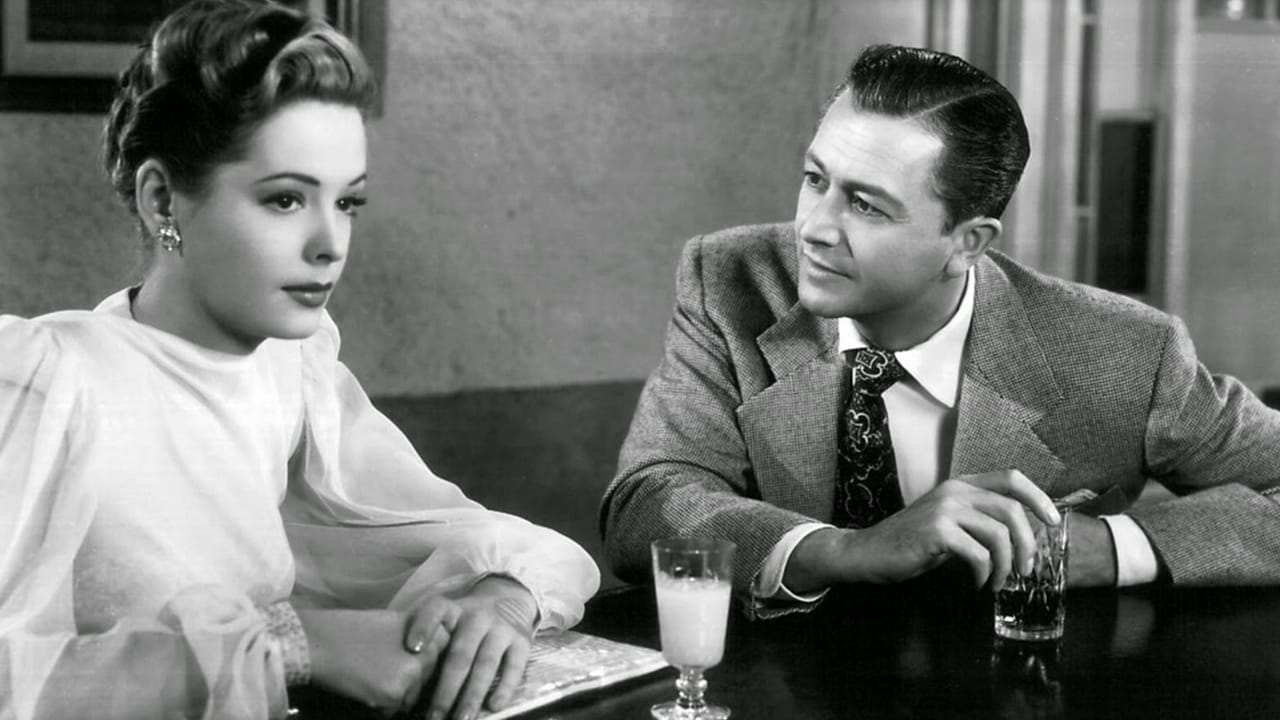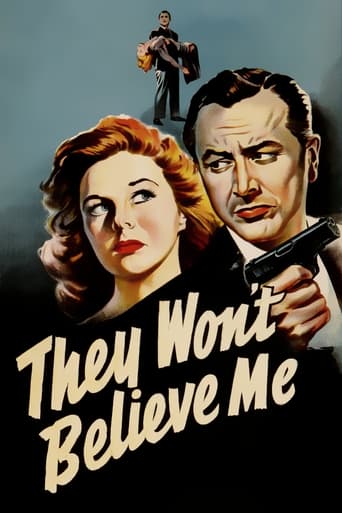

Wow! Such a good movie.
... View MoreToo many fans seem to be blown away
... View MorePurely Joyful Movie!
... View MoreThe thing I enjoyed most about the film is the fact that it doesn't shy away from being a super-sized-cliche;
... View MoreThis is a great film. Anyone who likes the film-noir genre should definitely make sure to catch this one. Great performances and a really nice story.
... View MoreFor some unaccountable reason, this brilliantly plotted crime drama has been consistently under-appreciated for decades. Its offbeat story is full of the kind of suspenseful moments and wonderful twists that make it riveting to watch and its conclusion is both unpredictable and deeply ironic. Unsurprisingly, for a film noir, greed, adultery and a murder trial feature strongly and the confusion that exists over the identities of a couple of dead bodies adds further intrigue to the whole proceedings.Larry Ballentine (Robert Young) is a young man who's on trial for the murder of his girlfriend Verna Carlson (Susan Hayward). In court, he's openly described by his own defence lawyer, as being heartless, shameful and cruel, however, the lawyer also asserts that his client, despite his character-flaws, certainly isn't a murderer and to convince the jury of this, the defendant is invited to the stand to give his account of the events that culminated in the death of Miss Carlson.Larry explains that despite being married to Gretta (Rita Johnson), who's a beautiful, wealthy and refined society lady, he also used to regularly meet magazine writer Janice Bell (Jane Greer) in a New York City restaurant on Saturday afternoons where they enjoyed drinks together and conversations about their shared interest in boats. Their feelings for each other became a problem when Janice announced that she could no longer carry on their relationship in secret and so had arranged to be transferred to her magazine's Montreal office. Larry told her that his marriage had become dysfunctional and that he intended to divorce Gretta. The couple then agreed to meet that evening to catch the night train to Montreal.Back home when Larry was packing his case, Gretta told him that she was aware that he hadn't been happy for some time and so had purchased a partnership for him in a Los Angeles investment brokerage and had rented a house for them in Beverly Hills. Larry, who'd married his wife for her money and social standing, found this prospect too good to refuse and so simply stood Janice up and moved to California. There, in his new job, a secretary called Verna Carlson caught his eye and soon they started an affair but when Gretta found out, she reacted by selling her share in the brokerage and allowed Larry to decide if he wanted to move with her to a mountain ranch that she'd purchased . Again, he followed the money but soon felt trapped living in such a remote location without even a telephone to enable him to keep contact with the outside world and so, when he got an opportunity, he contacted Verna and rekindled their relationship.In court, Larry then goes on to describe in detail how this decision led to the deaths of both Verna and Gretta and to him facing a murder charge.As Larry's story is told, it becomes clear that he's a parasitic playboy with no integrity, work-ethic or concern for anyone else but himself. Furthermore, he's a serial adulterer who has no qualms about planning to relieve his wife of the money from her bank account or planning to murder her. Strangely, for someone with so many reprehensible qualities, he's portrayed in this movie as an affable and rather friendly guy who doesn't suffer any kind of regrets or pangs of conscience about his behaviour until he winds up in court. Robert Young's marvellous portrayal of this character makes him surprisingly sympathetic and as a result adds an extra layer of enjoyment to this superb movie. The supporting cast also provide good performances with Rita Johnson, Jane Greer and Susan Hayward all perfect in their important roles."They Won't Believe Me" is visually strong with some high-angle camera shots and expressionistic cinematography which contribute strongly to its atmosphere. Its strongest features however, are its plot and its sharply written script which brings the action to life so effectively.
... View MoreThere she is, Jane Greer, as cool and beautiful as ever, and yet she is dumped by Robert Young. Now how do you figure that? Not only that, but he also dumps Susan Hayward at her most sleek and flirtatious. So who is this guy? Well, he is Robert Young at his most amiable, perfectly cast as a charming man of shallow feelings whose main interests are money and comfort. And those come from his rich wife, expertly played by Rita Johnson, aged 34 at this time. The next year she appeared in THE BIG CLOCK (1948, see my review). But it was in that year, 1948, that she suffered a terrible accident which caused severe brain damage and ended her career as a major actress. Her career had lasted only eleven years, and although she made appearances afterwards in films, she was never a significant player again, and died tragically at the age of 52 of a brain haemorrhage. This film therefore shows her off at her best, only months before her accident. This film also shows Jane Greer at the very peak of her talents and allure. This was the film she made just before OUT OF THE PAST (1947, see my review), in which she gave an Oscar-worthy performance of staggering power and malignity. So here is Robert Young, smug and comfortable, and certainly not willing to leave his wife and her money, no matter how many beautiful and irresistible women he has affairs with, and who want him for themselves. It is thus a perfect recipe for a major noir film, which this certainly is. Because of course Young is accused of murdering one of the gals. But there are numerous twists to this tale, and we know, though the prosecutor does not, that Robert Young did not really kill Susan Hayward at all, because we saw her die in a car crash. But the trouble is, Young pretended that the woman in the car crash was his wife (who has meanwhile disappeared because she too is dead), so how can he now explain that it was really Susan Hayward in the car crash (burned beyond all recognition) and that he therefore could not possibly have murdered her? Try telling that to a jury. This is certainly a classic noir situation. The film is excellently directed by Irving Pichel, and due to his direction and the dynamic cast, the film is extraordinarily compelling, and it really is a superb film noir.
... View MoreThis dark drama with its ironic ending would have made a splendid episode of "Alfred Hitchcock Presents" and why not? Joan Harrison, she who chose projects, was the producer both on this film and on the TV series. The whole enterprise has a slightly familiar character. For instance, this is RKO, the same studio that produced Val Lewton's psychological horror films five years earlier. And Lewton's "The Leopard Man" has a curious scene involving a ball balanced on top of a stream of water spurting vertically from an indoor fountain. If you liked the fountain in "The Leopard Man," you'll enjoy seeing it again.The plot is a little too complicated to spell out in any detail. Basically the story is told in flashback, narrated by Robert Young, murder suspect, in a courtroom. But in no way is it anyone's idea of a courtroom drama.Young is a stock broker in New York, married to the wealthy Rita Johnson, for whom he feels nothing but for whom he feigns much. Young has this thing going on the side with the appealing Jane Greer, film noir icon. He decides to divorce Johnson and take off with Greer, but Johnson uncovers the plan and buys Young out with a promotion and a transfer to a new life for both of them in Los Angeles. Young forgets all about Greer. Money talks.In Los Angeles, he begins a fling with the youthful, slender, and sexy Susan Hayward. Like Greer, she wants Young to divorce his wife and marry her. All women want us rich and handsome men to marry them. Anyway, that's three women, so far. Two end up dead and the third a conniver who still loves him. I won't give away the ending, which must have been demanded by the code.It struck me as rather slow going and some of the plot elements don't add up. I'll give an example. Young gets transferred to LA, right? And later, Greer also is moved to LA. And they bump into each other accidentally at a restaurant. In Los Angeles? Who's kidding whom around here? Nobody meets anybody accidentally in Los Angeles. It's a city of willing strangers. Not to mention that in 1947 the population of Los Angeles was 3,645,000. And if that's not enough of a contrivance, it happens AGAIN -- this time in Kingston, Jamaica. This second encounter is part of a plan but neither Young nor the viewer is in on it.How is Robert Young as a functioning psychopath? Not so hot. He's smooth enough but in a "nice" way, as if he's a genuinely good guy underneath all those shenanigans, and the local opinion at the time was that he really WAS a nice guy. This intrinsic goodness actually imbues his character with a little sympathy. He's not a stereotypical, heartless villain. He ACTS like one, yet he seems honestly to mean what he tells his various girl friends. He hasn't got many notes on his instrument and was to find his metier on TV with "Father Knows Best" and "Marcus Welby" of the reassuring smile.Rita Johnson isn't exactly plain, and her character is honest in its self interest, but she provides nothing more than a setting for the two glistening gems that surround her -- the exquisite Greer and the nubile Hayward.However, if you enjoy rather extended stories of lies, intrigue, and deaths, with a duplicitous male as the central figure, you might enjoy this movie. It's not bad, not insulting, and its done with craftsmanship -- but that's all. It's dead serious and lacks poetry. Think of how the electrocuted cat was handled by the cops in "The Postman Always Rings Twice" and then compare it to the cops and the dying horse by the waterfall here. You'll see what I'm getting at.
... View More